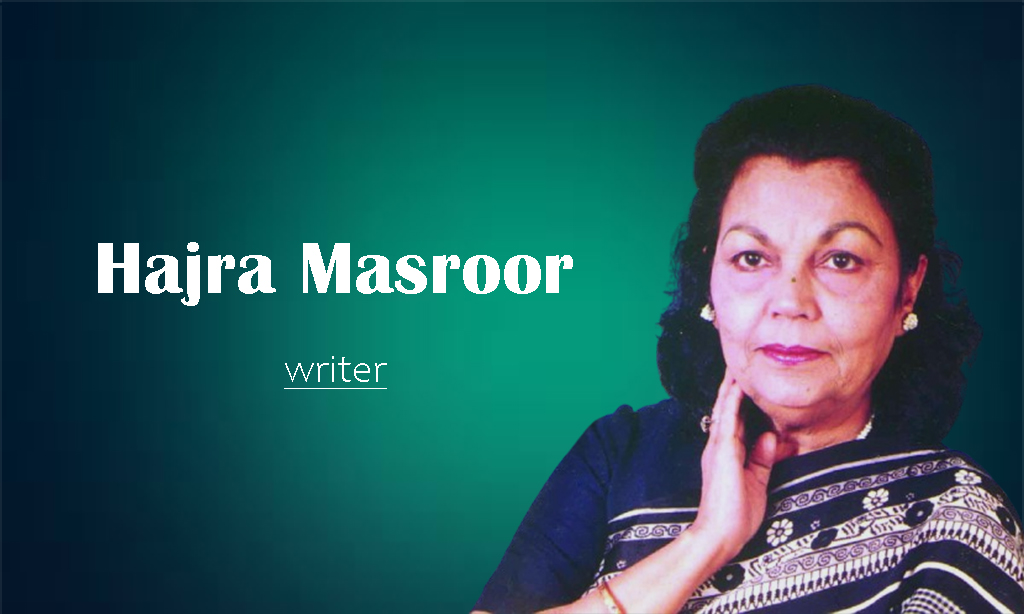Hajra Masroor was a Pakistani writer. Masroor is well-known herself for her short fiction stories, known as Afsana in Urdu literature. Additionally, her elder sister, Khadija Mastoor, was also a skillful short story writer and novelist. Masroor achieved a prominent position in the world of Urdu literature through her writings and continues to hold a special place in her readers’ hearts.
Personal life:
Hajra Masroor was born on January 17, 1930, in Lucknow, India, to Dr. Syed Tahoor Ali Khan, who was a British Army medical doctor. And she had suddenly died after a heart attack.
Among her five sisters, there was an additional well-known writer, Khadija Mastoor, and a young brother, Khalid Ahmad, who also became a poet, playwright, and newspaper columnist. Her family was mainly raised by her mother. She began writing in her early childhood.
after the independence of Pakistan in 1947. She and her sisters wandered to Pakistan and established in Lahore. An Urdu writer wrote in his book that no one knew Hajra was engaged to famous Urdu poet Sahir Ludhianvi, but once in a literary gathering, Ludhianvi definite a word imperfectly.
Hajra complained to him, got angry, and the engagement was broken. Later, she married Ahmad Ali Khan, who was the editor of the Daily Down for 28 years. They were married for 57 years before he died in 2007. They have two daughters. She was the younger sister of Khadija Mastoor, a noted writer in the history of Urdu literature.
Career:
Hajra Masoor began writing short stories at an early age. Her short stories published in literary magazines had received high gratefulness from Urdu literary circles. She edited the literary magazine Naqoosh with Ahmad Nadeem Qasmi. Qasmi was also a friend of hers and her sister.
Hajra Masroor made her place in the history of Urdu literature and Urdu fiction with a bold imagination and the writing of short stories in a non-traditional way. She wrote simple yet effective prose and had a down-to-earth style of writing.
She wrote several books of short stories in which she raised social, political, legal, and economic rights for women equal to those of men.
Hajra Masroor was one of the torchbearers of the progressive writers’ movement and one of the developers of equal rights in the subcontinent.
Shorts stories:
Chand ke doosri taraf
Tisri Manzil
Andhere ujale
Choori chupe
Ha-ai-Allah
Charkhay
Woe log
Charagh ki lau par
Sargoshian
Masoom Mohabbat
Works:
Hajra was a writer of short fiction and plays. A new translation of a collection of Hajra Masroor’s work, The Monkey’s Wound and other stories, by translator Tahir Naqvi, now gives English readers a chance to read eighteen of her stories, all centered around the hardships of being a woman in pre-partition India and the new state of Pakistan. Masroor lived from 1929 to 2012 and started writing in the early 1940s, several years before partition.
Stories:
‘’ In the Darkness’’
The first story, “In the Darkness,” tells of a young woman named Zehra, who is a de facto maid to her brother, ordering her to bring food and drink when he entertains friends. Zehra overhears a friend or brother speak of equality in a marriage.
It was a new concept to her, and she could not stop thinking about it.
‘’How much a man who understood his wife’s pain would love her, how happy their lives would be.
Then she would not have to spend all her time handling the stove, pots, and pans in the dark, stifling atmosphere of the kitchen. She would study a lot, have nice conversations with him, and together they would travel extensively.
Her dreams are dashed when she overhears her friend speaking of his own future. In other stories, young women look forward to equal marriages but also have their dreams thwarted.
‘’On the other side of the moon’’
In this story, “On the Other Side of the Moon, eighteen-year-old Lalli is matched with a husband around her age. He’s tall, good-looking, comes from a good family, and has a good job. On the day of the wedding, Lalli is sad to leave her family, but her father convinces her that she will be happy in her marriage to such a suitable husband.
‘’The third floor’’
The third floor refers to the Karachi apartment building where Miss Dorothy Pereira lives. She’s Christian from Goa and loves nothing more than to dance.
She spends her days in her apartment dancing, so much so that a downstairs neighbor named Mr. Dougles takes to his violin to accompany Dorothy each time he hears her start to dance.
But the other neighbors are not so kind and view Dorothy with great suspicion. Their worries don’t abate when Dorothy orders a fancy pair of sandals from Hanif, the shoemaker. The sandals are taken from a design that Marilyn Monroe wore.
Death:
Hajra Masroor died on September 15, 2012, in Karachi, Pakistan.


